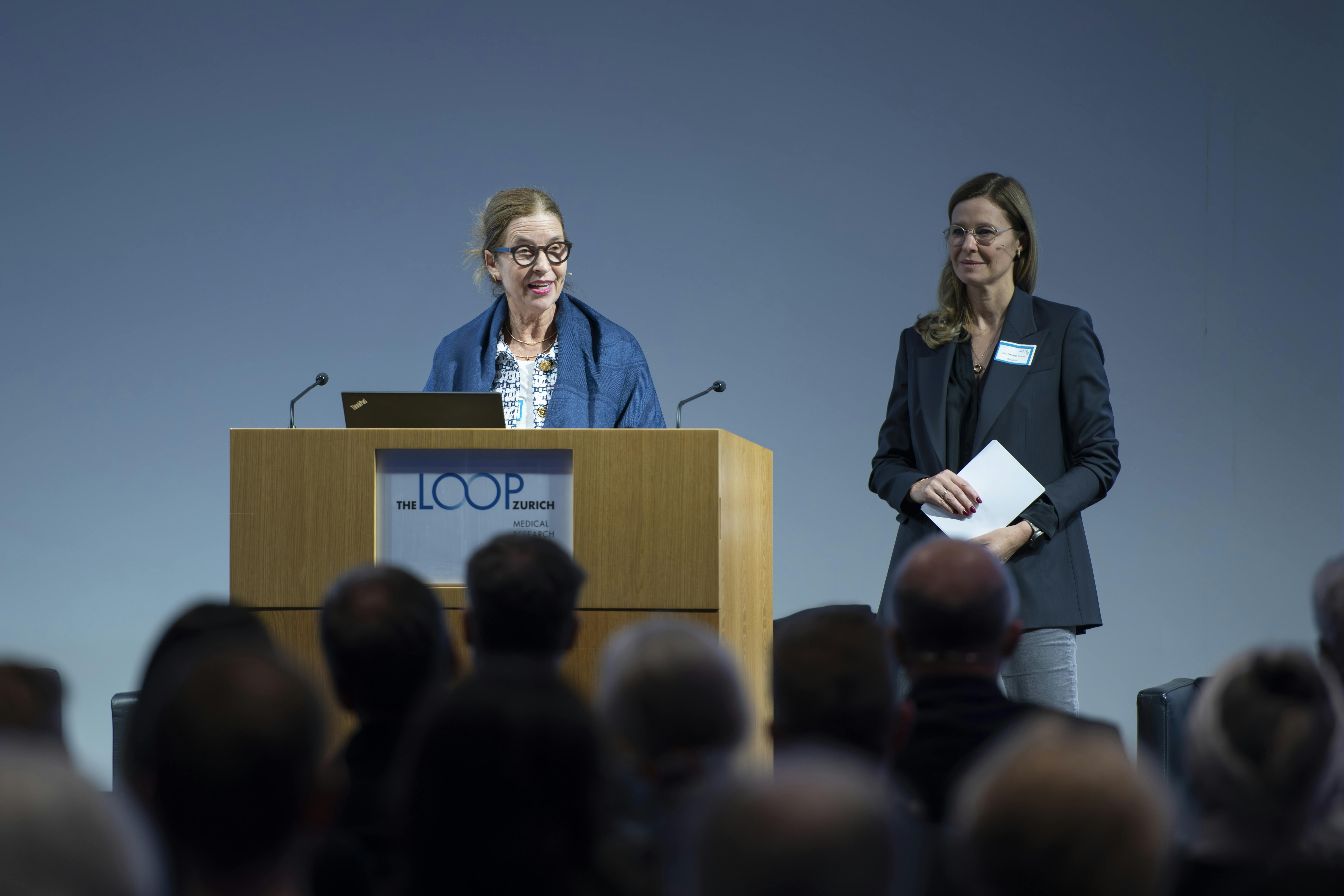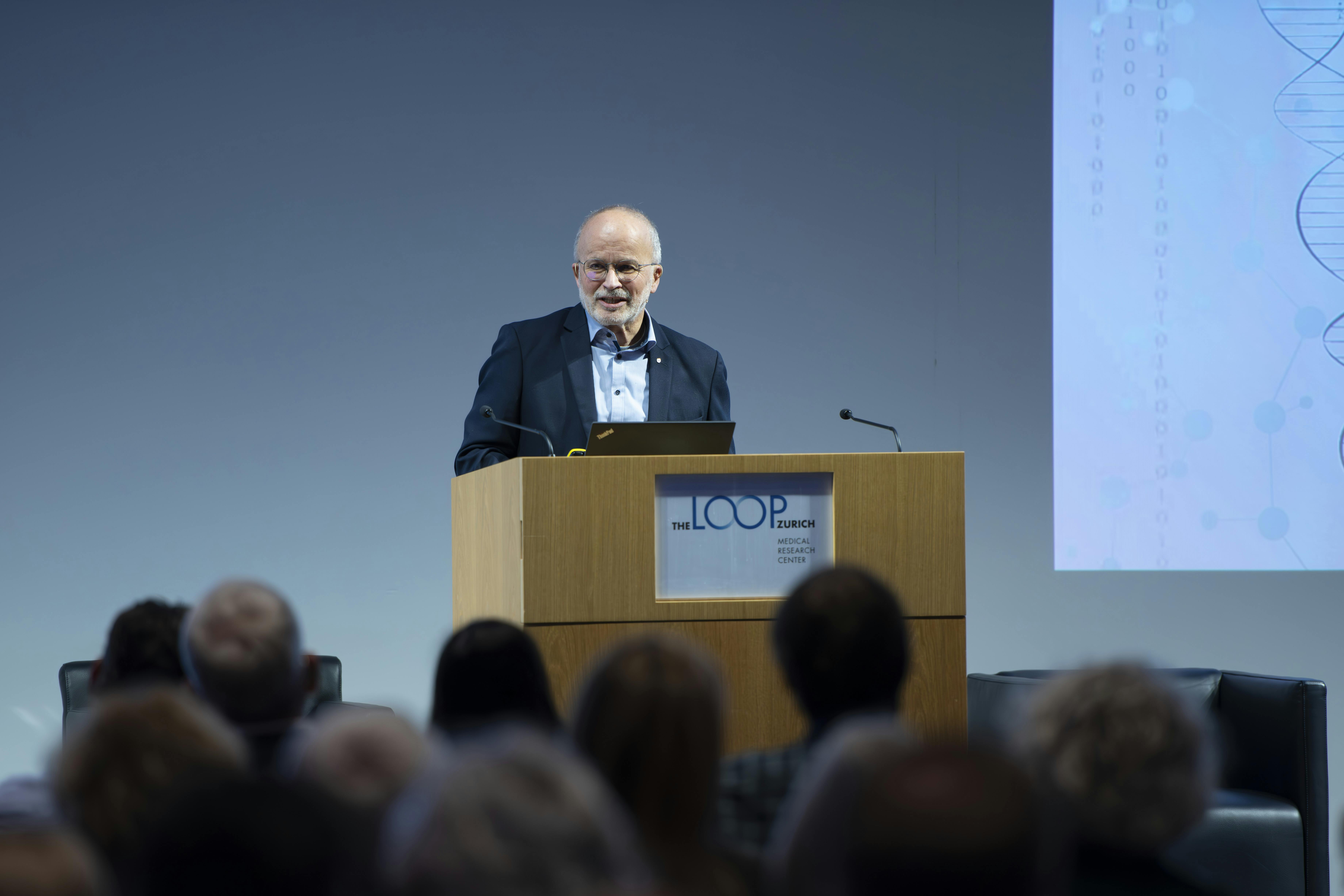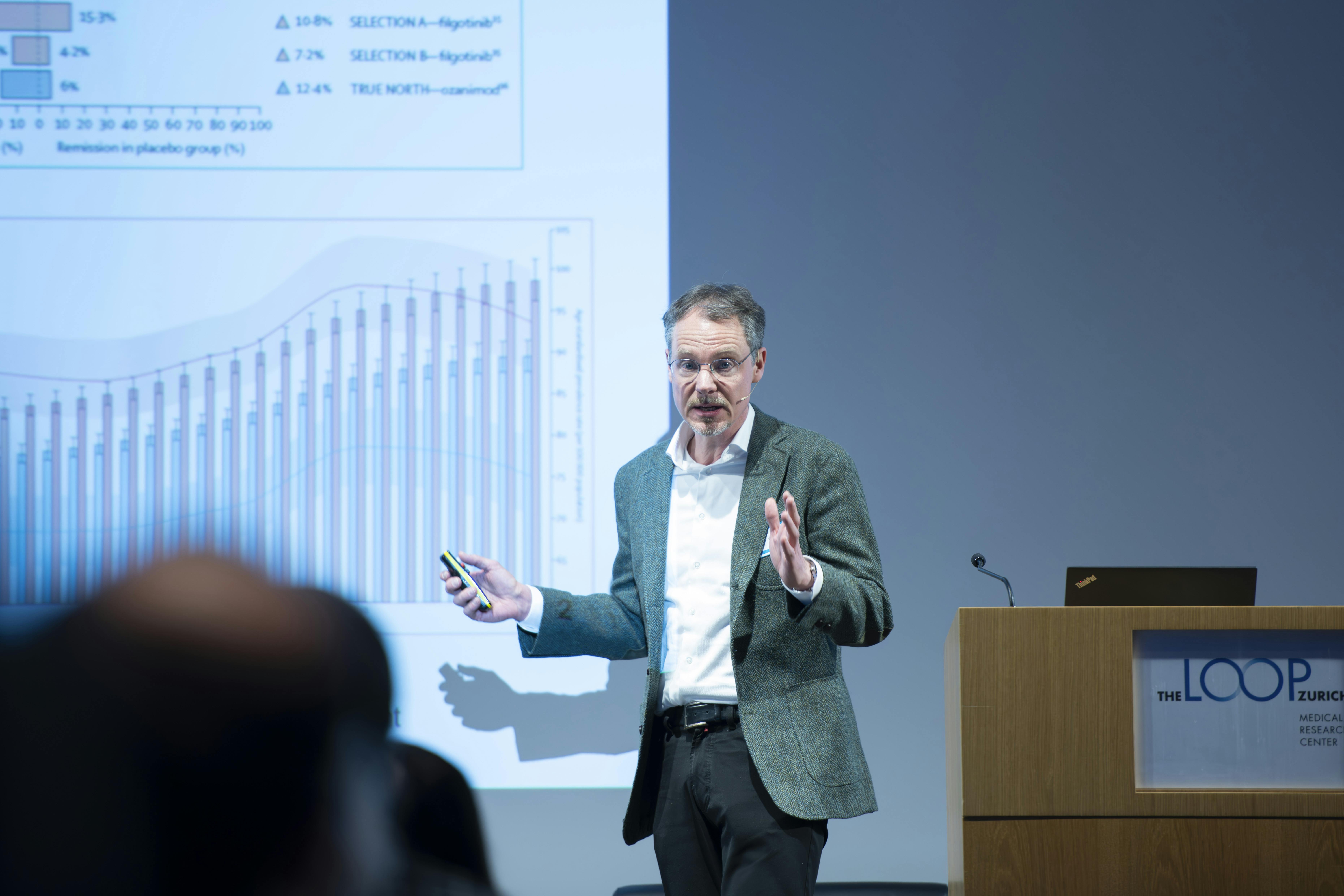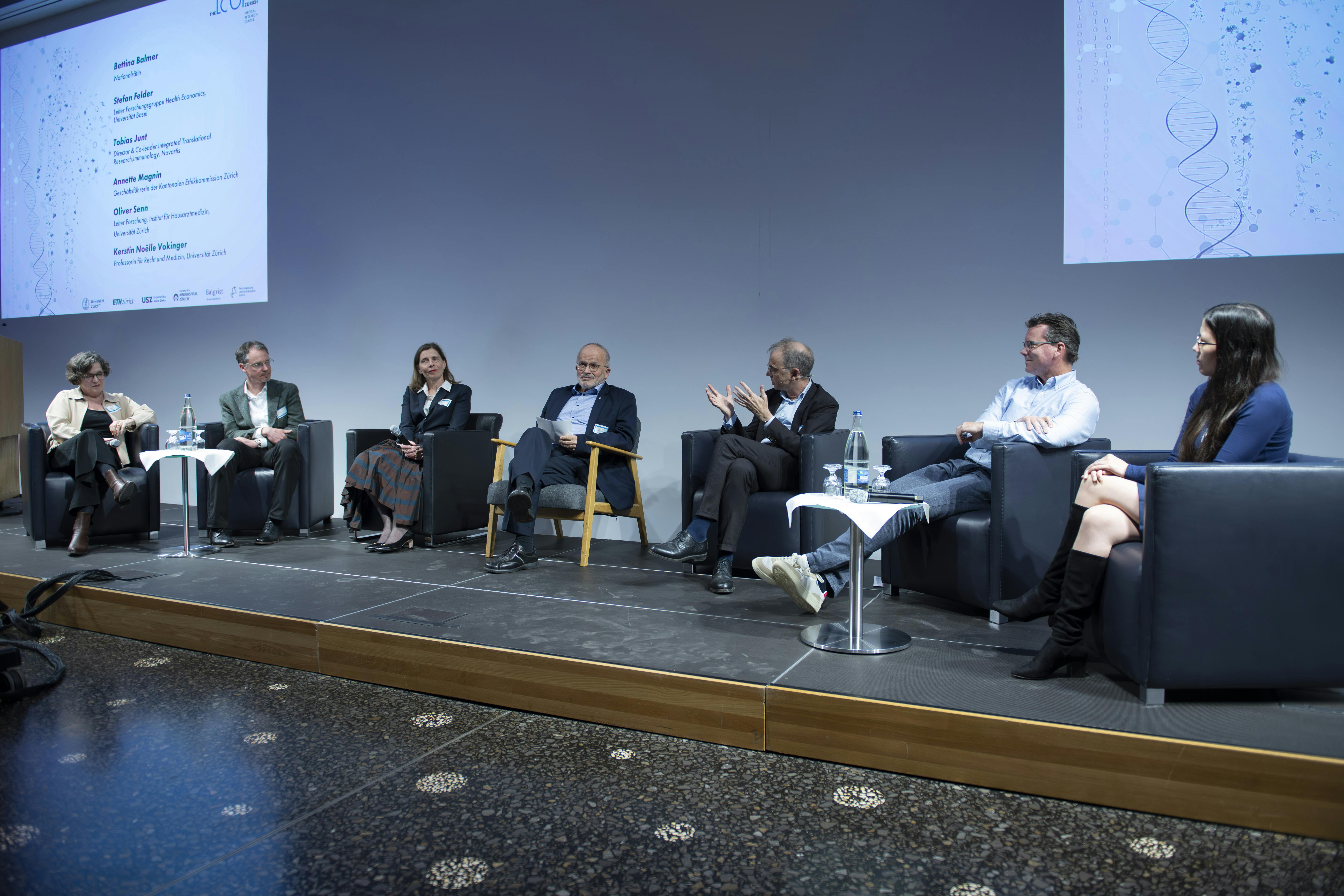A new era for medicine
What are the latest findings in precision medicine? This year’s annual event held by The LOOP Zurich provided an overview of the current state of research and asked how accepting society is of precision medicine.

Beatrice Beck Schimmer, Vice President Medicine Zurich, used her talk to emphasize the far-reaching impact of LOOP research projects, with each aimed at turning medical findings into applications as quickly as possible.
Jens Selige, General Manager of The LOOP Zurich, welcomed the many who attended its third annual event. The LOOP Zurich is the medical research center jointly run by the University of Zurich, ETH Zurich, and the University's four hospitals. With a twinkle in his eye, Selige announced a surprise guest: And the screen duly showed an AI-powered avatar of Johann Lukas Schönlein, the first dean of the Faculty of Medicine at the University of Zurich. Schönlein helped usher in a new era for medicine around 1800, with the transition from a natural-philosophical approach to one underpinned by the natural sciences. «I have a dream,» was the message. «Artificial intelligence will transform medicine into precision medicine. Diagnostics and treatment plans will be sped up, particularly in oncology. Therapies will be targeted and tailored to genetic profiles, and biomarkers will provide early indicators. There will be a revolution in patient monitoring. Prognosis models will analyze genetic data and lifestyle in order to better assess risks and promote both early detection and prevention,» explained Schönlein.
What was barely conceivable in 1833 – when the University of Zurich was founded and Schönlein was at work – is now becoming a reality. And Selige believes artificial intelligence is one of the factors driving this.
Successful projects and launch of the BioMedical Informatics Platform
Beatrice Beck Schimmer, Vice President Medicine Zurich and a founding member of The LOOP Zurich, used her talk to emphasize the far-reaching impact of LOOP research projects, with each aimed at turning medical findings into applications as quickly as possible. The result is added value for society.
Julia Dannath-Schuh, Vice President for Personnel Development and Leadership at ETH Zurich, stressed how important it is to promote translational research. She made a case for The LOOP Zurich becoming part of the research landscape in the long term.
The major translational projects at The LOOP Zurich, such as mTORUS, StimuLOOP, INTeRCePT, or LOOBesity, are currently making good progress, according to Markus Rudin, a founding director of The LOOP Zurich. Now the course is set for clinical applications. Another project involves the BioMedical Informatics Platform (BMIP), whose first beta version will be tested in the next two months. «We are keen to finish development in 2025.» Data, including, for example, from medical research projects at the University’s four hospitals, is to be collated, saved, and harmonized in the BMIP – so converted into a format that allows the individual hospitals to share information. There are also plans to integrate existing biobanks, containing things like tissue samples, into the platform in future. The data on the platform is subject to the same strict data protection requirements as apply at the hospitals.
Researchers wishing to work with the data will now find it quicker and easier to access than before. They will no longer have to worry about the various legal and administrative issues, as these are a matter for the institutions and database managers. Once researchers have been given permission, it takes around two weeks until they can access the BMIP. This represents an ambitious target for the BMIP, but these are very favorable conditions for researchers. «It is a two-way street though, and we expect the results to be fed back into the platform,» said Rudin.

Markus Rudin, one of the founding director of The LOOP Zurich, gave an update on the BMIP, which is expected to be fully operational by 2025.
Two new incubator projects
In 2024, two new projects were launched with the title «incubator» and are expected to start in 2025. One of the two projects is concerned with the prevention of systemic sclerosis (SSc). This is a chronic autoimmune disease, which leads to the hardening and scarring of connective tissue in the skin and internal organs and is associated with high mortality. With the help of precision medicine strategies, researchers are looking to develop therapies to facilitate treatment before the disease flares up. «It is about detecting patients at risk at an early stage and identifying biomarkers,» according to Rudin.
The second incubator project, under the name «AI Tumor Board,» is concerned with a personalized decision-making aid in the area of precision oncology. So-called tumor boards are where physicians from various fields discuss diagnostics and treatments for cancer sufferers. The aim is to give each individual person the correct treatment. The tumor boards at University Hospital Zurich and the Children’s Hospital are involved in the new incubator project. Another project is the UZH biobank, which is due to be set up in the first quarter of 2025. Rudin stressed that all this research would not be possible without the invaluable support of the foundations involved and thanked the sponsors in attendance.

Tobias Junt, Director of Translational Research at Novartis, spoke about the decisive impact of precision medicine on understanding diseases that are related at a molecular level.
Game-changing molecular disease analysis
Tobias Junt, Director of Translational Research at Novartis, painted a picture of precision medicine from an industry perspective. According to Junt, inflammatory and autoimmune diseases are on the increase. However, medicines used for these diseases will often have limited efficacy, and not all patients show the same response to these medicines. As a result, many therapies have not been achieving the desired effect. Therefore, a more precise understanding of disease is required, along with improved clinical study designs and more precise and personalized measurement of clinical efficacy.
Close collaboration needed between various stakeholders
As Junt explained, gaps in understanding and data, so-called «valleys of death,» will often become apparent on the journey from clinical studies to clinical practice, or from basic research to applied research. Faced with these challenges, precision medicine has prompted a paradigm shift, with people now considering the relationship between diseases, rather than looking at them in isolation like before. A molecular understanding of diseases has been developed, which includes taking a step nearer to mapping a molecular atlas of diseases. This may open up new treatment options. Junt cited two diseases to illustrate his point, namely lupus and Sjögren’s syndrome. Both are chronic inflammatory autoimmune diseases and are related at a molecular level. He finished with a plea for close collaboration between patients, physicians, and academics. This is the only way to drive precision medicine forward.

Panel debate: Annette Magnin, Tobias Junt, Bettina Balmer, Markus Rudin, Stefan Felder, Oliver Senn, Kerstin Noëlle Vokinger
Keeping an eye on costs
The next panel debate (see end of the article for participants) featured politicians, ethicists, business people, academics, and primary care practitioners, who engaged in a lively discussion on the question: «So who is actually interested in precision medicine?» The discussion covered areas like rising costs within the healthcare sector, data security, and the basic ethical and legal prerequisites for big data in a medical context.
Bettina Balmer, a member of the Swiss National Council and an attending physician at University Children’s Hospital Zurich, explained that precision medicine was a subject close to her heart. From her experience in children’s medicine, she knew the importance of individualized approaches. But feasibility does not always equate to affordability, and this is something that has to be discussed. Stefan Felder from the University of Basel agreed. Research costs always have to be looked at in relation to the rising costs within the healthcare system. Oliver Senn from the Institute of Primary Care at the University of Zurich stressed the important role played by primary care physicians, who offer patients tailored medical diagnoses and treatments on a daily basis. «We are always the first point of contact, and 90 percent of care is ultimately delivered in a practical setting. In order to do this, we need the consultation with the physician, the clinical examination, and sometimes laboratory data as well.» At the same time, Senn emphasized the efficacy of primary care. «The basis for patient-centered medicine is a trusting relationship between patient and physician,» claimed Senn.
Annette Magnin from the Zurich Cantonal Ethics Committee highlighted the role of patients within research projects. «The necessary research cannot be done without them either,» she pointed out. It is a case of earning their trust and getting them involved. Kerstin Vokinger, a Professor of Law and Medicine at the University of Zurich, spoke about data security and the question of who owns the health data generated during research. There are conflicts of interests between the various stakeholders, such as patients, research, or industry. «Everyone only wants the best outcome, namely medical progress, but the fact that so much data is needed – including sensitive data – has the potential for conflict,» according to Vokinger. It is up to the law to strike a balance.
Credits
Text: Marita Fuchs





